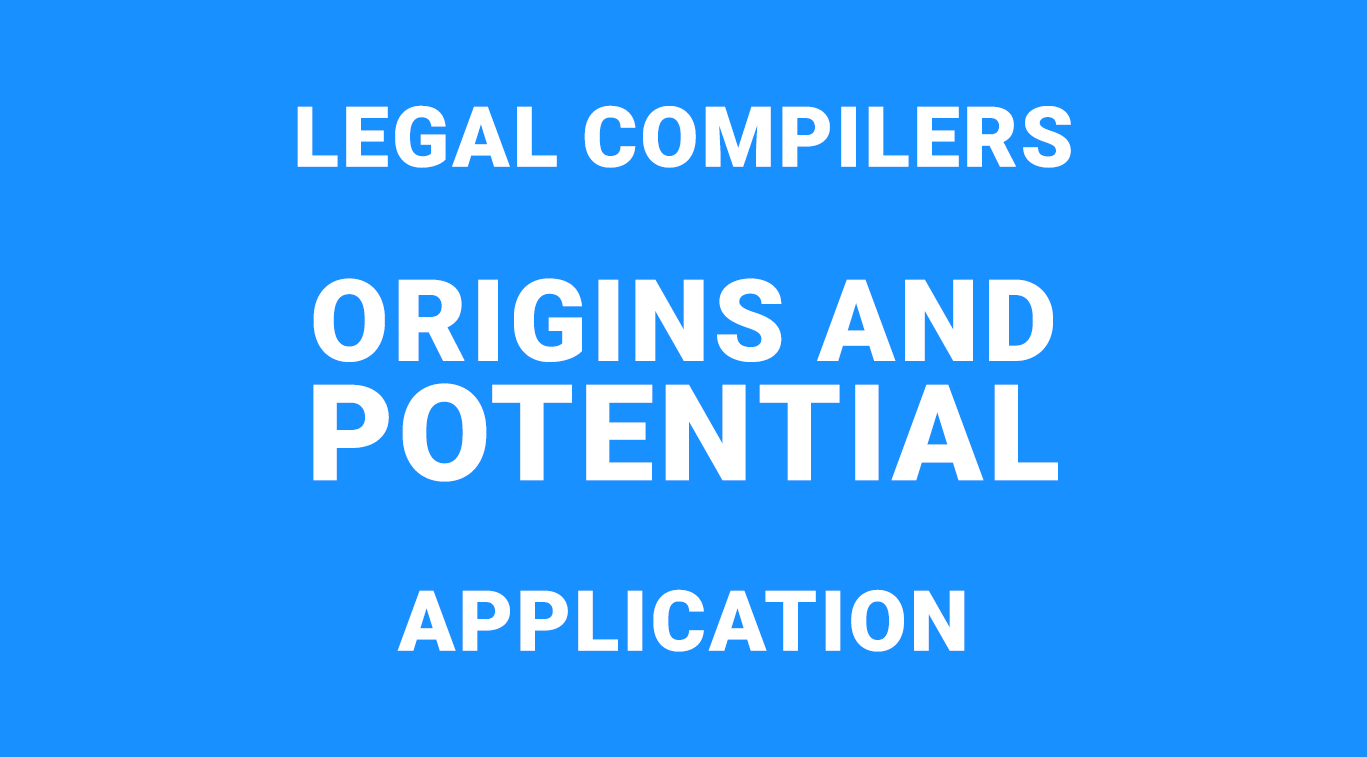Legal Compilers - Origins and Potential Application

Wriiten by Joshua Fraser
Blogger

In the Good Law Software tech law blog, two particular types of legal tech software are typically discussed, or rather the legal technology solutions that are analysed can be divided into two distinct categories;
I (Theoretical) High-Legal Tech:
This category encompasses legal technology software that is technologically superlative. The kind of technologies that fit into this category, such as applied Artificial Intelligence (‘AI’), specifically ‘Theory of Mind’ and ‘Limited Memory’ AI, or augmented reality, would entirely reshape the legal sector, should/when they come to fruition.
For example, while advanced AI is slowly but surely becoming increasingly feasible, its high-end applications are so advanced that they are not yet achievable, not just in the legal sphere but also in society as a whole.
II Extant Legal Tech:
All currently existing commercial legal technology falls into this category to some degree. While contemporary legal tech is changing and advancing, its development is within parameters and boundaries that are set by the ambient level of technology available today.
For example, legal timekeeping and billing software or legal marketing software exist in a comprehensive form today, but are still advancing and improving and may in the future spawn whole new, and difficult to predict, sub-functions that will further enhance the practice of law.
Like a microsized, localised and binary Kardashev scale focused entirely on technology in the legal sector, these two categories contrast the current, yet still impressive, reality of legal technology and the futuristic and thought-provoking possibilities that lie on the horizon.
However, there is space for tertiary category, where advanced legal tech applications that are just in their nascent stage can be categorised. In other words, a category that details the pinnacle of legal tech innovation, while still staying within the bounds of current realisation.
One technology that fits neatly into this middle category is that of a legal compiler. This is an application that can synthesise a wide range of legal documents and concepts to provide a form of conceptual database that could be used to analyse existing legal documents for errors and risks or serve as an aid to creating new legal documentation.
In a sense, this application is already established. However, its current stage is nascent, and with no premier suppliers on the market, it is not yet utilised fully in the legal sector.
In contrasting markets, such as that of spell-checker programs, this kind of application is better utilised, though this is due to the lower level of difficulty in the target task – analysing a contract for legal errors is inherently more challenging, for a program, than checking a given spelling against a word bank and suggesting or implementing a change based on a similarity index.
However, the concept of a Legal Compiler is not only deeper and more complicated than the idea of a spell checker, but also owes its origins to a more esoteric function of a similar name. Specifically, Legal Compilers can be satisfyingly linked to compile coding languages, or code compilers. Properly utilised for the first time in 1952, compilers, in the sphere of computing, are special sub-programs that convert or translate the coding language the programmer is using into machine language (binary 1s & 0s) that the computer can ‘understand’. Often, however, compilers also contain feedback mechanisms that let a programmer know that a particular string, or part of their program is incorrect and will need changing in order for the program to run correctly. In some cases, the program will even tell the user what exactly the error is and how to correct it. This can be an alphanumeric mistake or an error with the logic of the program.
It is this latter function that is most applicable to legal technology. Using a Legal Compiler, a lawyer would be able to have the legal terminology in a given document, say a Will, analysed for mistakes and ultimate effect. Using the example of a Will, a lawyer could run a Legal Compiler program to check the validity of a Final Will and Testament they might have just drafted or received. If, for example, this Will has a non-charitable provision a Legal Compiler would be able analyse the provision to see if its trust purpose falls within the Re Endacott provisions. Under the hood, this would be a rather elementary task for a compiler as it would simply involve checking to see if the trust purpose is for the maintenance of animals, monuments/graves or inaction of masses. Stretching the example, what might be more complicated, for a compiler, would be correctly matching the provision of the trust purpose to the relevant perpetuity rule, in this case inalienability, and, as is necessary with the rule against inalienability, considering if the trust purpose will be complete within the mandatory 21 year period, or, in the event of a specified life in being clause, whether it will conclude within that time period.
This would involve a considerable level of analytical ability, where the compiler would be capable of not only identifying the law, but also considering the real world effect of the provision and comparing the two, beyond simply flagging the provision as a potential issue for the using lawyer, as current iterations do.
Such a functionality has the potential to be one of the most powerful examples of AI legal document review. Necessarily, to reach its best version, legal compilers would need to utilise machine learning techniques to synergise the combined ‘learning experience’ of inspecting a proportionally massive number of documents in order to most accurately and consistently identify issues and causal consequences. Indeed, this is what prevents this particular technology from falling into the extant legal technology category. Until machine learning is developed to a standard capable of making a program such as this truly effective, this technology will likely be confined to the periphery of the legal technology sphere.
Nonetheless, it is this potential that promises to cement Legal Compilers as one of the most helpful and exciting future tools for law and legal practice.
References:
[1] David Bolon, ‘What Is a Programming Complier and What Does it Do?’, ThoughtCo at https://www.thoughtco.com/definition-of-compiler-958198
[2] ‘The Impact of Digital Technologies’ United Nations at https://www.un.org/en/un75/impact-digital-technologies
[3] David Wilde, ‘Trusts of Imperfect Obligation’, The International Academcy of Estate and Trust Law at https://academic.oup.com/tandt/article/28/4/298/6565370
[4] David Wood, ‘Limits on Technology: Natural, Economic & Ethical’, Study.com at https://study.com/academy/lesson/limits-on-technology-natural-economic-ethical.html#:~:text=The%20three%20main%20types%20of,understanding%20of%20the%20univers
[5] Nathan Benaich and Ian Hogarth, ‘State of AI Report 2021’ at https://www.stateof.ai/
[6] Evgeniy Krasnokutsky, ‘Machine Learning Technoogy Trends to Impact Business in 2022’ at https://mobidev.biz/blog/future-machine-learning-trends-impact-business
[7] Naveen Joshi, ‘7 Types of Aritficial Intelligence’, Forbes at https://www.forbes.com/sites/cognitiveworld/2019/06/19/7-types-of-artificial-intelligence/?sh=5b3d82fa233e
[8] ‘The Reading and Writing of Legal Documents’, NSW Government, Communities & Justice at https://www.lawaccess.nsw.gov.au/Pages/representing/lawassist_readingwritinghome_wysk/lawass
ist_reading_wysk/lawassist_reading_wysk.aspx
[9] ‘What is a Compiler In Computer Science?’’, The Sass Way at https://www.odoo.com/blog/business-hacks-1/in-house-accounting-the-pros-and-the-cons-208
[10] ‘Semantic Analysis’, Monkey Learn at https://monkeylearn.com/blog/semantic-analysis/#:~:text=Semantic%20Analysis%20Techniques-,What%20Is%20Semantic%20Analysis








